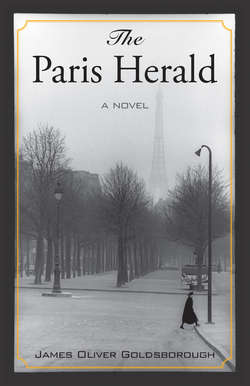Читать книгу The Paris Herald - James Oliver Goldsborough - Страница 5
На сайте Литреса книга снята с продажи.
AUTHOR’S NOTE
ОглавлениеAny American traveling in Paris in the late nineteenth or early twentieth century came across the Paris Herald at one time or another. It was available in the same kiosks on the Champs Elysées and quais along the Seine as the latest article in l’Aurore by Zola or the newest installment by Proust in his never-ending search for lost time. The Paris Herald, founded in 1887, belonged to Paris as much as did Zola or Proust.
Between the world wars, that same traveler would have found the Herald not only in Paris but anywhere he went in France. Each evening at 10:30 trucks lined up along the rue du Louvre to receive stacks of newspapers fresh off the press and bound for the rail stations. Hemingway, Fitzgerald, Cole Porter, Gertrude Stein, Josephine Baker, any American who could afford to live or travel in France at the time could be sure his newspaper would be at the Paris stations in time for the eleven o’clock trains to Normandy, Brittany, the Côte d’Azur.
In the 1920s – that brief, giddy interlude between catastrophes – Americans began to find the Herald outside France as well. Those same trucks from the rue de Louvre now carried newspapers each night to the Gars de l’Est, du Nord, and St. Lazare for journeys northward. Across Europe, the Paris Herald was the one way, the only way, to stay in touch with things American. In 1928 it became the first newspaper to be distributed by air, with daily planes to London. It was as much America’s gift to Europe as the Statue of Liberty was France’s gift to America.
James Gordon Bennett, Jr., founder of the Paris Herald in 1887 and son of the founder of the New York Herald, died in Paris in 1918, but there was never any question of scrapping his newspaper. In 1924, with the merger of the New York Herald and New York Tribune, the Paris Herald became the Paris Herald Tribune and moved from the cramped rue du Louvre to the rue de Berri, off the spacious Champs Elysées. In all those years, the only break in publication came in the early 1940s. But Hitler was soon gone from Paris and the Herald Tribune back to the rue de Berri.
From Bennett, ownership passed to the Reids of New York and then to Jock Whitney, also of New York. As the American presence in Europe grew in the 1950s, the Paris Herald Tribune could be found everywhere in Europe, including in Communist East Europe, though behind the Iron Curtain you had to know someone to get it.
Naturally, it attracted imitators. The Wall Street Journal planned and canceled a European edition in the early sixties. The New York Times launched a Paris edition in 1961, but lacking the Herald’s name and history was never successful. In 1966, when union strikers forced the New York Herald Tribune to close its doors, the Washington Post bought into the Paris paper. The following year, the Times closed its Paris edition and bought a minority interest in the joint Whitney-Post Paris paper, hating every minute of it and vowing revenge. The new paper became the International Herald Tribune.
The Paris Herald has seen a lot, and now must suffer the indignity of seeing its hallowed name forever erased by the New York Times. Some of this story has been told, nowhere better than in Charles L. Robertson’s history of the newspaper. But having lived through the critical years, 1965–1970, when the newspaper and the regime of Charles de Gaulle were both fighting for their lives, I’ve always thought those intertwined stories, and the people responsible for them, deserved to be told. This is an historical novel with a few names changed just to be nice.
